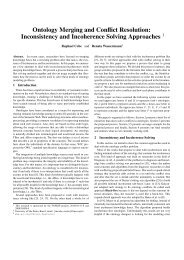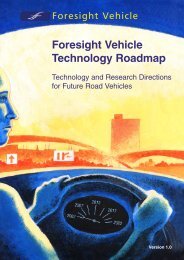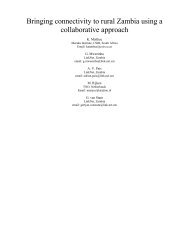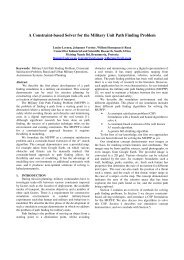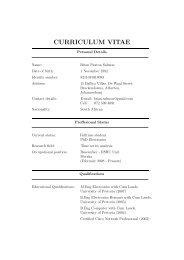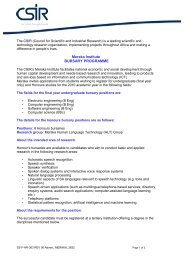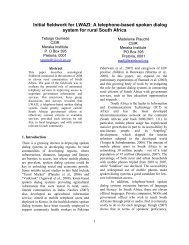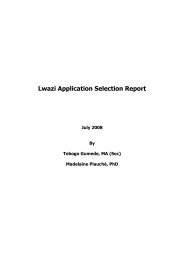A general-purpose IsiZulu speech synthesizer - CiteSeerX
A general-purpose IsiZulu speech synthesizer - CiteSeerX
A general-purpose IsiZulu speech synthesizer - CiteSeerX
Create successful ePaper yourself
Turn your PDF publications into a flip-book with our unique Google optimized e-Paper software.
8 S.Afr.J.Afr.Lang.,2005, 2is ‘expected to be today’. A number of the evaluators provided the actual information, not the fictionalinformation 1 .• Evaluators found it difficult to choose a negative answer – even where they knew the negative answerto be correct. For example, while evaluator E106 answered the malaria question incorrectly, it becameclear from the post-evaluation discussion that he actually did understand the message clearly. However,since he understood contact with human blood to be the way in which the mosquito contracted malaria(information provided by the TTS system), and saw that is ‘bad’, he chose the other (incorrect) answer.In the same vein, the employment related question asked whether ‘only an employer’ should contributeto the Unemployment Insurance Fund. Even evaluators, who in subsequent questioning indicated thatthey understood that both the employer and employee should pay, still chose ‘yes’ because the employershould contribute, rather than ‘no’ (the correct answer) since the double negative required to answer thequestion correctly was unnatural to them.This demonstrates the complexity involved when using a comprehension test with low literacy evaluators: an areain which significant further research is required.The subjective opinions of E1 evaluators were similar to those of E0 evaluators with regard to intelligibility(3.8 average compared to 3.6) and slightly lower with regard to naturalness (2.8 average compared to 3.2).While the comprehension test (which does not compensate for the issues mentioned above) indicates a low levelof intelligibility (1.4 average), the results of the subjective evaluation are very encouraging. In light of thesecomplications, detailed results of the objective evaluation are not included here.ConclusionInitial experiments with the isiZulu test system have produced encouraging results. The voice was found to be quiteunderstandable by the majority of evaluators – both those with high levels of literacy and those with limited or noliteracy. Since much of the information was outside the weather domain, which was the focus of this development,it is safe to consider this as a domain-independent result. (In fact, comprehension was best in the non-weatherdomains, for reasons described above.)Clear room for improvement remains, both in terms of the characteristics of the TTS system, and in our evaluationthereof. The design of comprehension tests for users of limited literacy will require particular attention. Interestingly,the lack of attention to prosodic information did not attract any specific comments from the evaluators, suggestingthat this may not be as important for understandable isiZulu TTS as had been believed. The lessons learnt will beapplied in refining our experimental approach, and in the continued development of the isiZulu TTS system.Notes1 The fact that 8 of the 9 E1 evaluators chose ‘sunny’ rather than ‘cloudy’ (the correct answer) testifies ofprevalent weather conditions in Gauteng during late winter.ReferencesClark, R.A.J., Richmond, K. & King, S. 2004. Festival 2: build your own <strong>general</strong> <strong>purpose</strong> unit selection <strong>speech</strong>synthesiser. Proceedings of the 5th ISCA Speech Synthesis Workshop. Pittsburgh, PA:173–178.Davel, M. & Barnard, E. 2004. The effficient generation of pronunciation dictionaries: Machine learning factorsduring bootstrapping. Proceedings of the 8th International Conference on Spoken Language Processing.Korea:2781–2784.Du Toit, T. 1999. An introduction to text-to-<strong>speech</strong> synthesis. Berlin:Springer.Gibbon, D. 2002. Typology of African prosodic systems, in Occasional Papers in Typology 1, edited by U. Gut &D. Gibbon. Bielefeld: Bielefeld. Occasional Papers in Typology 1.




